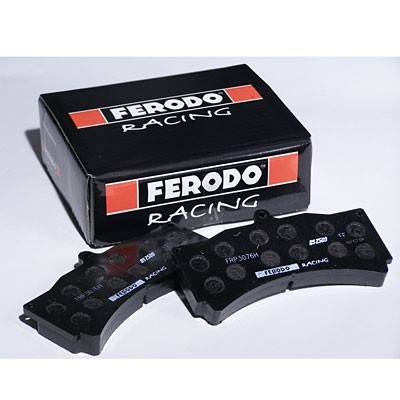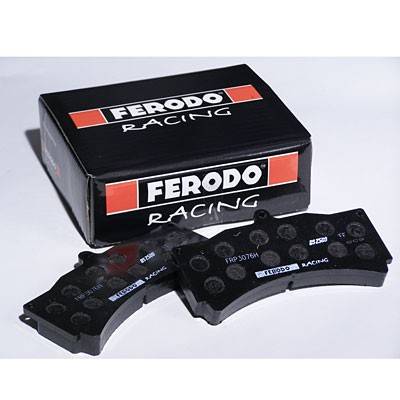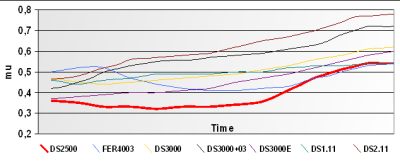Ferodo DS3.12 FCP878G Dodge Viper / Lotus Rear
FCP878G
DS3.12 is a high-output, heavy duty circuit compound. It has been developed in testing in top-level GT racing and is suitable for larger and heavier non-formula cars on the track. It is superior to other Ferodo compounds both in friction coefficient and maintenance of its performance at very high temperatures. It has a predictable and constant friction output throughout its operating range, regardless of brake pressure. Its torque profile in the early stages of the brake event means it manages the introduction of ABS in a smooth manner.
The main characteristics of DS3.12 are:
• Highest friction coefficient and bite in the Ferodo Racing range
• Reproducible and stable performance up to 850°C under all pressure and speed conditions
• Excellent management of ABS during the brake event
• Longest pad life of Ferodo Racing range under heavy duty track use
• Recommended for track use on larger vehicles with ABS
• Recommended for sprint and medium duration races
The main characteristics of DS3.12 are:
• Highest friction coefficient and bite in the Ferodo Racing range
• Reproducible and stable performance up to 850°C under all pressure and speed conditions
• Excellent management of ABS during the brake event
• Longest pad life of Ferodo Racing range under heavy duty track use
• Recommended for track use on larger vehicles with ABS
• Recommended for sprint and medium duration races
Pricing:
$597.15
Description
The main characteristics of DS3.12 are:
High coefficient of friction (max 0,54) at all speeds and temperatures
Very high initial bite
Excellent disc life and condition
No fade. Strong torque profile.
Good pad life
Low off-brake drag/Excellent release
Unvarying performance throughout pad life
Firm pedal. Always.
WARNING: DS3.12 IS NOT SUITABLE FOR ROAD USE
DS3.12 is recommended for rally applications and sprint races.
All part numbers in the range feature a suffix. This suffix identifies the material compound available for each part number.
H = DS2500 C = 4003 R = DS3000 M = DS3000 Plus 03 E = DS3000 Endurance W = DS1.11 G = DS3.12
WARNING: DS3.12 IS NOT SUITABLE FOR ROAD USE
DS3.12 is recommended for rally applications and sprint races.
All part numbers in the range feature a suffix. This suffix identifies the material compound available for each part number.
H = DS2500 C = 4003 R = DS3000 M = DS3000 Plus 03 E = DS3000 Endurance W = DS1.11 G = DS3.12
Technical Specifications
Manufacturer Part # FCP878G
FMSI # D0491
Composition Semi-metallic
Category Full Race
Max Operating Temp 1400*F
Dust High
Noise Moderate
Bite/Mu High to Very High
Judder/Vibration Low
Pad Wear Moderate to High
Rotor Wear Low to Moderate
FMSI # D0491
Composition Semi-metallic
Category Full Race
Max Operating Temp 1400*F
Dust High
Noise Moderate
Bite/Mu High to Very High
Judder/Vibration Low
Pad Wear Moderate to High
Rotor Wear Low to Moderate
Bedding & Installation
Please follow your vehicle service manual for installation instructions, or have the work performed by a qualified technician.
Ferodo's recommended bedding procedure:
During manufacturing, all Ferodo racing products are subject to “chemical bedding” to stabilize the materials and resins used in construction of the pad. Although this “prebedding” is an effective method and sufficient for low temperature use, the ultimate results are achieved by actual bedding on either the car or dyno...
How ? ...
This subjects the pad to the correct heat and torque loads seen in race conditions. These methods transfer pad material into the face of the rotor leaving a “transfer film” the friction generated between the pad face and this transfer film determines the performance of the “bite”. Correct bedding also ensures that materials which may become compressible are stabilized with the heat and pressure to avoid a “spongy pedal”.
Why? ...
When bedding in the car always try to bed on used rotors. If bedding on new rotors follow the rotor bedding instructions of the manufacturer, as it is important to heat cycle them first before bedding the pads. After fitting the new pads prepare the car by blocking off 50 percent of the brake cooling / air ducts to speed the “heat up time”. When leaving the pit lane apply brake gently at low speed to ensure pads are fitted correctly, build up temperature progressively to approx 350° C (670° F). This enables the heat to distribute around all areas of the pad.
When brakes are at suitable temperature begin bedding process, achieve approximately 70 percent of race speed then perform 25-30 brake applications at half normal race pedal pressure holding on for 4 seconds. When this is completed use a slowing down lap to allow brakes to cool. Return to the pit lane and allow pads to cool completely, check rotor appearance. Transfer film should be constant around rotor face, any “patchy” deposit will result in brake pedal judder. The use of temperature paint on rotors enables more accurate bedding procedures.
Ferodo's recommended bedding procedure:
During manufacturing, all Ferodo racing products are subject to “chemical bedding” to stabilize the materials and resins used in construction of the pad. Although this “prebedding” is an effective method and sufficient for low temperature use, the ultimate results are achieved by actual bedding on either the car or dyno...
How ? ...
This subjects the pad to the correct heat and torque loads seen in race conditions. These methods transfer pad material into the face of the rotor leaving a “transfer film” the friction generated between the pad face and this transfer film determines the performance of the “bite”. Correct bedding also ensures that materials which may become compressible are stabilized with the heat and pressure to avoid a “spongy pedal”.
Why? ...
When bedding in the car always try to bed on used rotors. If bedding on new rotors follow the rotor bedding instructions of the manufacturer, as it is important to heat cycle them first before bedding the pads. After fitting the new pads prepare the car by blocking off 50 percent of the brake cooling / air ducts to speed the “heat up time”. When leaving the pit lane apply brake gently at low speed to ensure pads are fitted correctly, build up temperature progressively to approx 350° C (670° F). This enables the heat to distribute around all areas of the pad.
When brakes are at suitable temperature begin bedding process, achieve approximately 70 percent of race speed then perform 25-30 brake applications at half normal race pedal pressure holding on for 4 seconds. When this is completed use a slowing down lap to allow brakes to cool. Return to the pit lane and allow pads to cool completely, check rotor appearance. Transfer film should be constant around rotor face, any “patchy” deposit will result in brake pedal judder. The use of temperature paint on rotors enables more accurate bedding procedures.
Details
- FCP878G
- FCP878G
- Ferodo
- New
Categories
Shipping Information
- Item Requires Shipping
- 6.5 lbs.
- W4.0000” x H3.0000” x L6.5000”
- Free FedEx / UPS Ground Shipping!
Customer Reviews
 Total Reviews (0)
Total Reviews (0)
You must login to post a review.






Write the First Review!